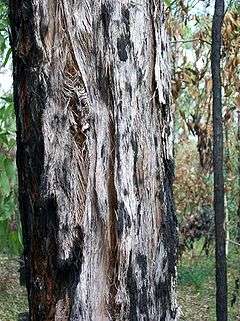Eucalyptus oblonga
| Narrow Leaved Stringybark | |
|---|---|
 | |
| Stringy bark of Eucalyptus oblonga, Ku-ring-gai Chase National Park, Australia | |
| Scientific classification | |
| Kingdom: | Plantae |
| (unranked): | Angiosperms |
| (unranked): | Eudicots |
| (unranked): | Rosids |
| Order: | Myrtales |
| Family: | Myrtaceae |
| Genus: | Eucalyptus |
| Species: | E. oblonga |
| Binomial name | |
| Eucalyptus oblonga DC. | |
| Synonyms | |
| |
Eucalyptus oblonga, known by the common name Stringybark, is a tree native to eastern Australia, restricted and localised around Sydney. It has a thick and fibrous stringy bark usually colored grey over reddish brown. They occur on the poorest soils in high rainfall areas, and are well suited to skeletal soils and frequent fires.
The Eucalyptus oblonga is commonly referred to as Narrow-Leaved Stringybark in textbooks, but as Stingybark by locals. Their leaves are not particularly narrow, being 6 to 10 cm long, 1.5 to 2.8 cm wide and are somewhat glossy. The leaves are lanceolate or sickle shaped, have almost the same shade of green on both sides and alternate on the stem. Juvenile leaves start out growing on opposite sides of the stem and are ovate in shape.
The Eucalyptus oblonga is a small tree up to 15 metres tall. It flowers in late summer to Easter. Gumnuts are stalkless, crowded together and measure up to 8 mm in diameter.


References
- "Eucalyptus oblonga". PlantNET - NSW Flora Online. Retrieved 2010-01-26.
- A Field Guide to Eucalypts - Brooker & Kleinig volume 1, ISBN 0-909605-62-9 page 74